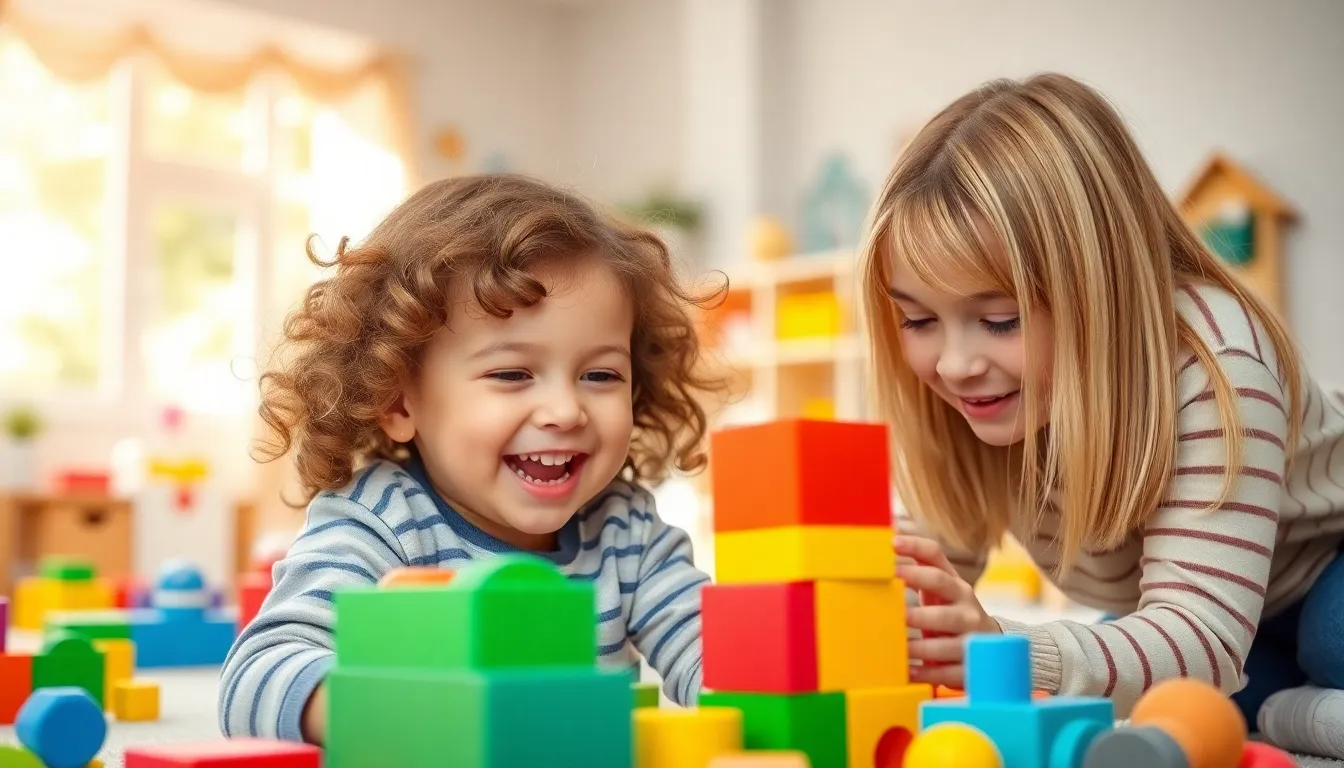Navigating the wild world of toddler sibling relationships can feel like stepping into a circus—complete with acrobatics, occasional meltdowns, and a whole lot of unpredictability. Whether it’s sharing toys or battling over the last cookie, these pint-sized power struggles offer a unique blend of chaos and camaraderie.
But don’t let the tantrums fool you; sibling bonds forged in the fires of playtime can lead to lifelong friendships. Understanding the dynamics at play can help parents foster a harmonious home where laughter reigns supreme and sibling rivalry becomes a thing of the past. Dive into the delightful—and sometimes hilarious—journey of toddler sibling relationships, where every day is an adventure filled with lessons, love, and a sprinkle of mischief.
Understanding Toddler Sibling Relationships
Toddler sibling relationships are complex and dynamic. These connections can shape emotional development and social skills.
Importance of Sibling Bonds
Sibling bonds serve as a fundamental support system. Strong relationships foster emotional intelligence in toddlers. Trust often develops through shared experiences, building resilience. Cooperation and conflict resolution skills emerge from interactions. Positive sibling connections promote a sense of belonging, crucial for a child’s well-being. Long-lasting friendships form during these formative years, impacting future relationships. Those bonds can be a source of both comfort and joy throughout life.
Common Dynamics Among Toddlers
Competition commonly arises in toddler sibling dynamics. Sharing toys often leads to disputes as toddlers navigate ownership. Differences in temperament influence interactions—some siblings may be more nurturing, while others assertive. Attention from parents fuels rivalry, especially during transitional phases, like a new sibling’s arrival. Playtime frequently becomes a mix of laughter and conflict, highlighting varying interests among siblings. Communication styles differ, with some toddlers expressing emotions verbally and others through actions. Parents can guide these dynamics, fostering cooperation and empathy.
Factors Influencing Relationships

Multiple factors shape toddler sibling relationships, impacting both dynamics and bond strength. Understanding these elements helps parents nurture supportive connections.
Age Gap Considerations
The age difference between siblings plays a critical role in their interactions. Smaller age gaps, such as 1-2 years, often lead to increased competition for attention and resources. Close siblings tend to engage in parallel play, sharing toys and experiences. Conversely, larger age gaps, like 3-5 years, typically foster more nurturing behaviors, with older siblings taking on caregiver roles. Each scenario has its unique challenges, so parental guidance is essential to navigate conflicts that arise during playtime. Supporting friendships among siblings of varying ages helps build empathy and understanding.
Personality Traits of Each Toddler
Personality traits significantly influence how toddlers interact with one another. Some children possess outgoing and assertive characteristics, while others might be more introverted or sensitive. These differences can lead to varying responses during play and conflict. An outgoing child may dominate games and push boundaries, potentially overwhelming a shy sibling. Conversely, an introverted toddler may struggle to advocate for their needs. Observing and understanding these traits allows parents to tailor their approaches, fostering communication and cooperation. Prioritizing emotional intelligence promotes healthier dynamics and strengthens sibling bonds.
Navigating Conflict and Competition
Navigating conflict among toddler siblings requires active parental involvement to guide interactions effectively. Parents must recognize signs of rivalry and address them before they escalate into larger issues.
Strategies for Parents
Establishing clear rules for sharing helps set expectations. Consistent consequences for aggressive behavior reinforce positive interactions. Utilizing separate play areas can provide space for children to explore independently, reducing confrontations. Offering choices during playtime allows toddlers to feel a sense of control, decreasing competition. Regularly demonstrating conflict resolution techniques, such as taking turns or using kind words, equips children with tools for future disagreements. Engaging siblings in cooperative tasks or games can also enhance their bond while promoting teamwork.
Encouraging Cooperation
Creating opportunities for collaboration fosters a united front among siblings. Parents can encourage joint play activities, such as building blocks or puzzles, which help develop shared goals. Praising cooperative behavior reinforces teamwork and highlights positive outcomes. Providing tasks that require both children to work together—like tidying up their toys—can further stimulate cooperation. Setting up family meetings allows toddlers to express feelings, ensuring their voices are heard while learning to consider others. This approach nurtures empathy and mutual respect, vital components in promoting harmonious sibling interactions.
Promoting Positive Interactions
Fostering positive interactions among toddler siblings leads to stronger relationships. Engaging in shared activities enhances their emotional connections and communication skills.
Shared Activities for Siblings
Participating in joint games can cultivate teamwork. Crafts, outdoor play, or building projects encourage collaboration. Coordinated activities, like cooking together, promote shared responsibilities and creative expression. Establishing turn-taking rules during games teaches patience. Regular playdates strengthen bonds. Parents can guide toddlers to appreciate each other’s contributions, enhancing cooperation during these fun moments.
Celebrating Individuality
Recognizing each child’s unique traits nurtures self-esteem. Siblings thrive when they receive individual attention. Parents can create opportunities for each child to showcase their talents, whether in art or sports. Acknowledging different interests prevents feelings of competition. Encouragement of personal achievements fosters mutual respect. Simple strategies, like one-on-one time with each sibling, ensure that every child feels valued and understood, which enriches sibling dynamics overall.
Navigating toddler sibling relationships is a dynamic journey filled with both challenges and opportunities. By fostering an environment that encourages cooperation and understanding, parents can help their children build essential skills for life. These early interactions not only shape their bond but also lay the groundwork for emotional intelligence and resilience.
Active engagement and recognition of each child’s individuality can transform rivalry into lasting friendship. With the right guidance, toddlers can learn to appreciate their differences and support one another. Ultimately, the experiences shared during these formative years will create a foundation for strong and healthy relationships that extend well beyond childhood.
